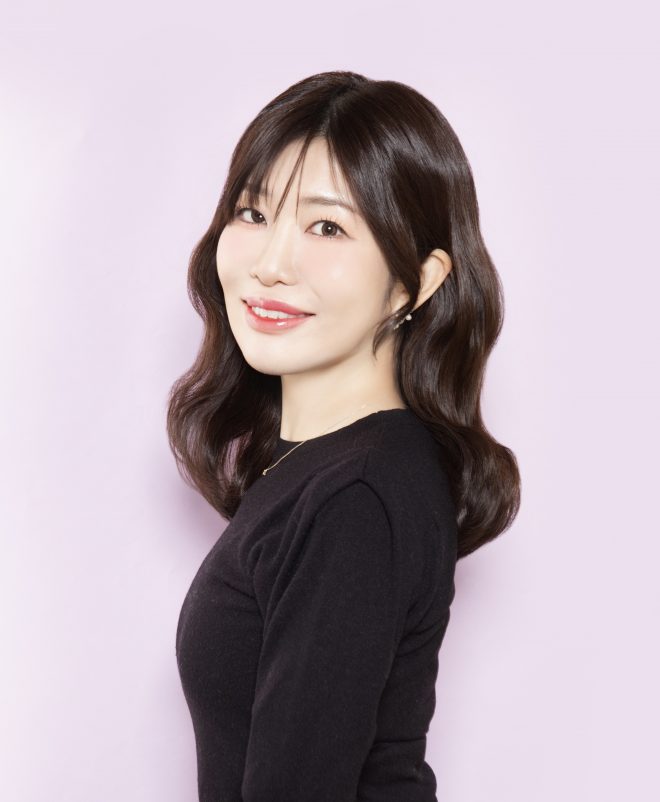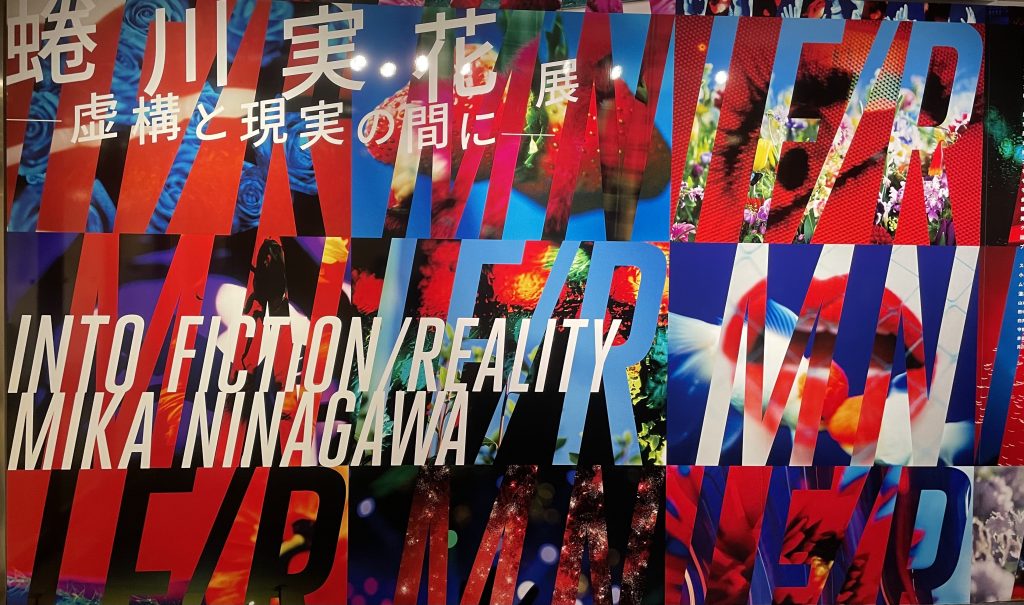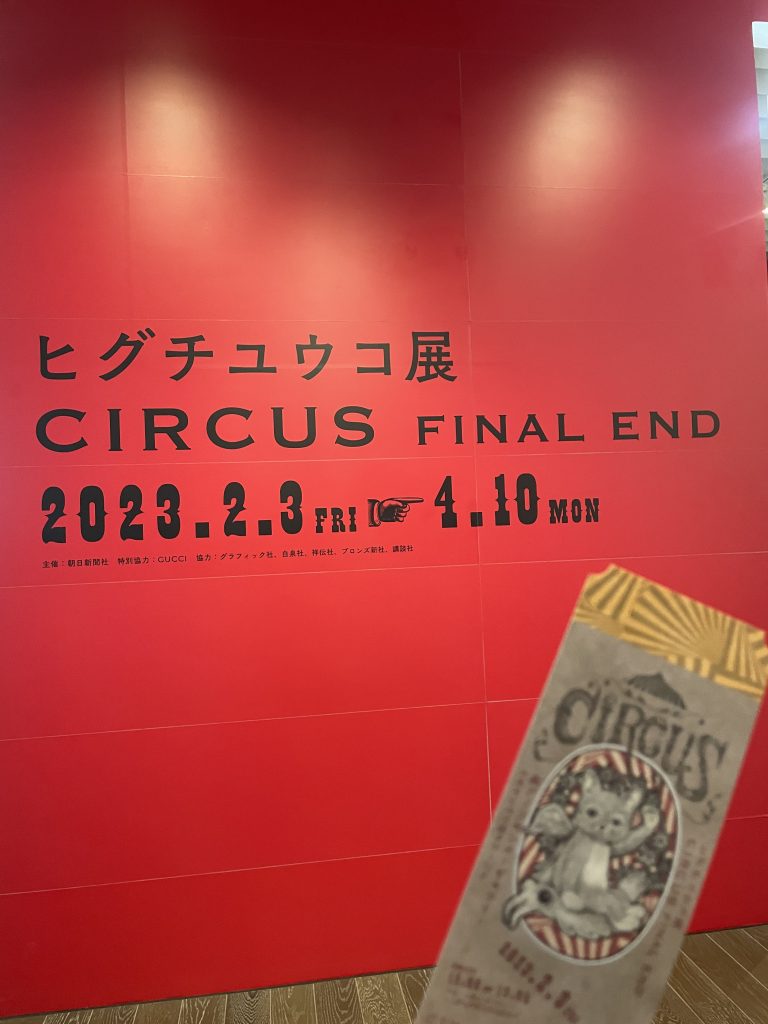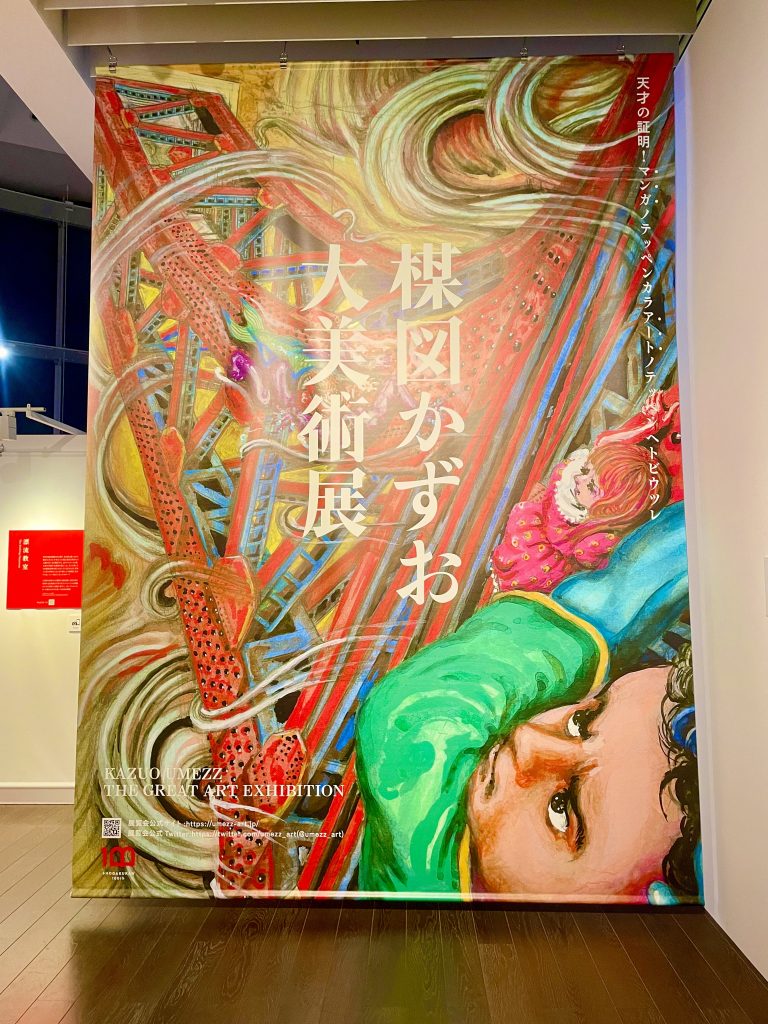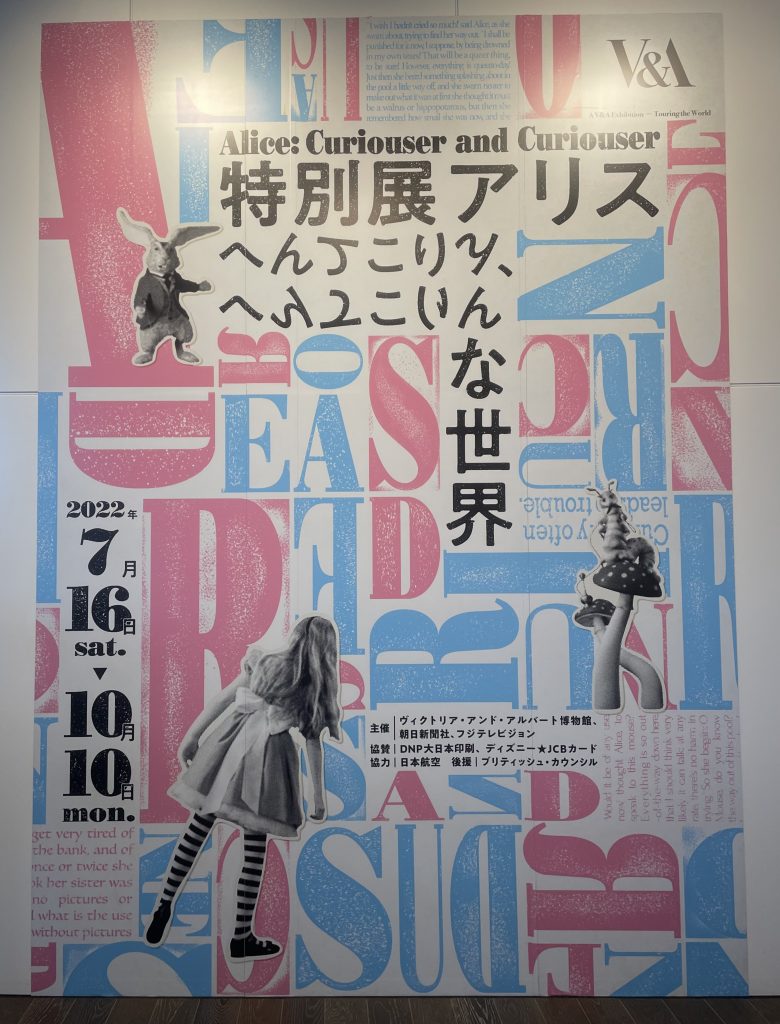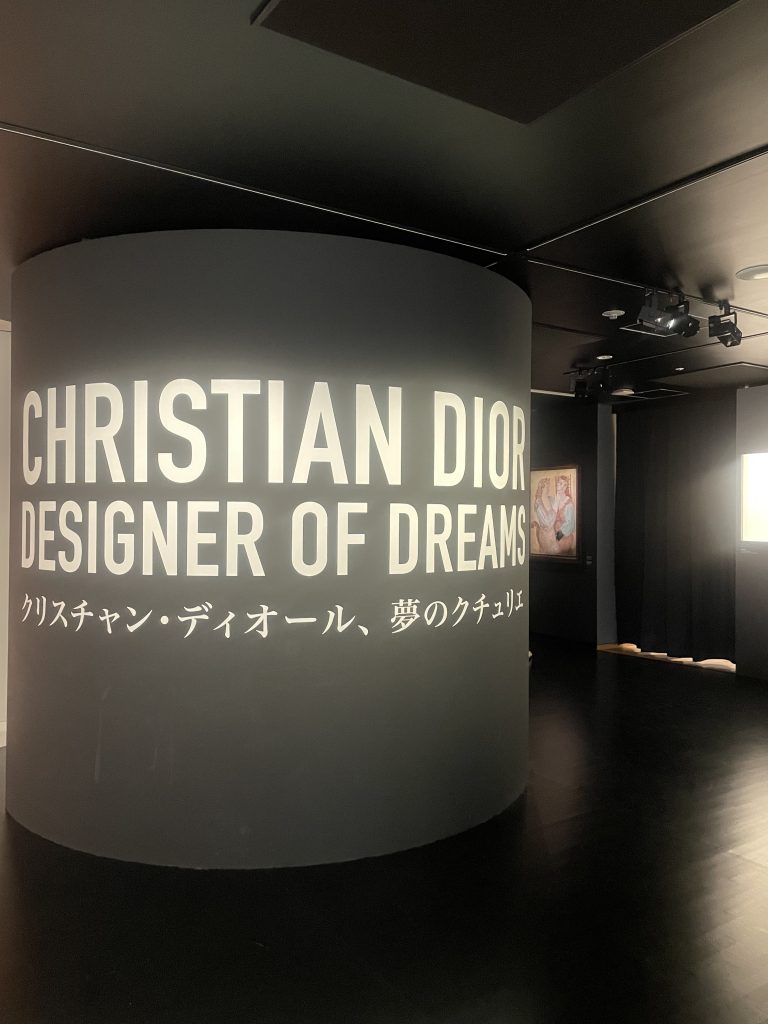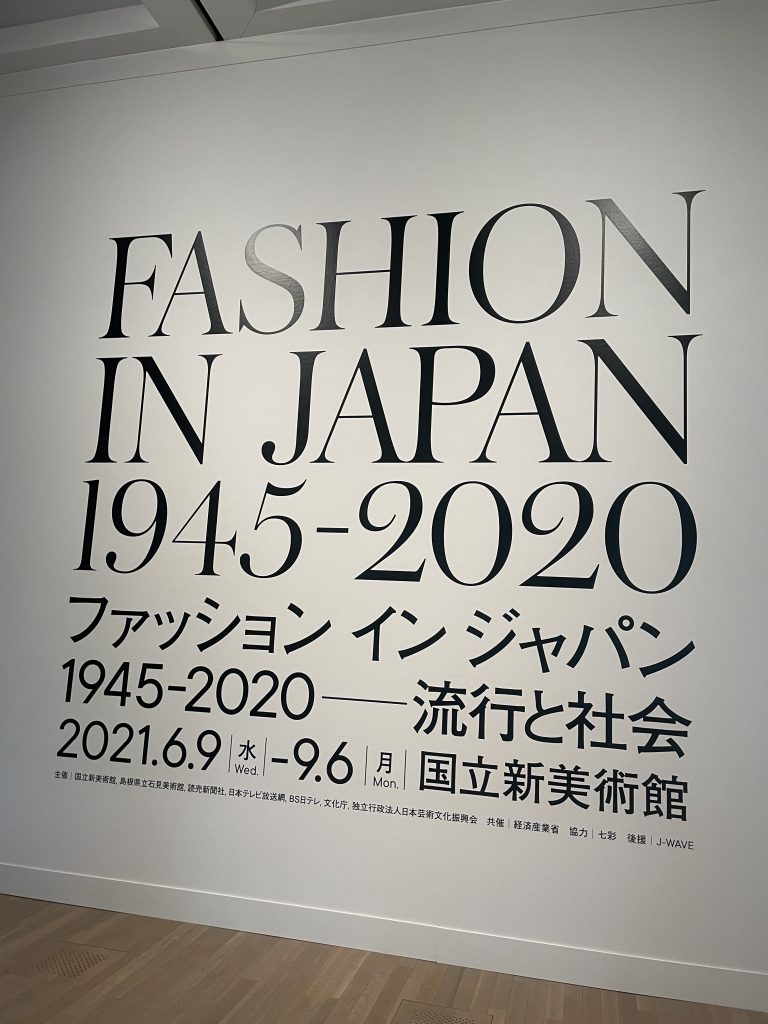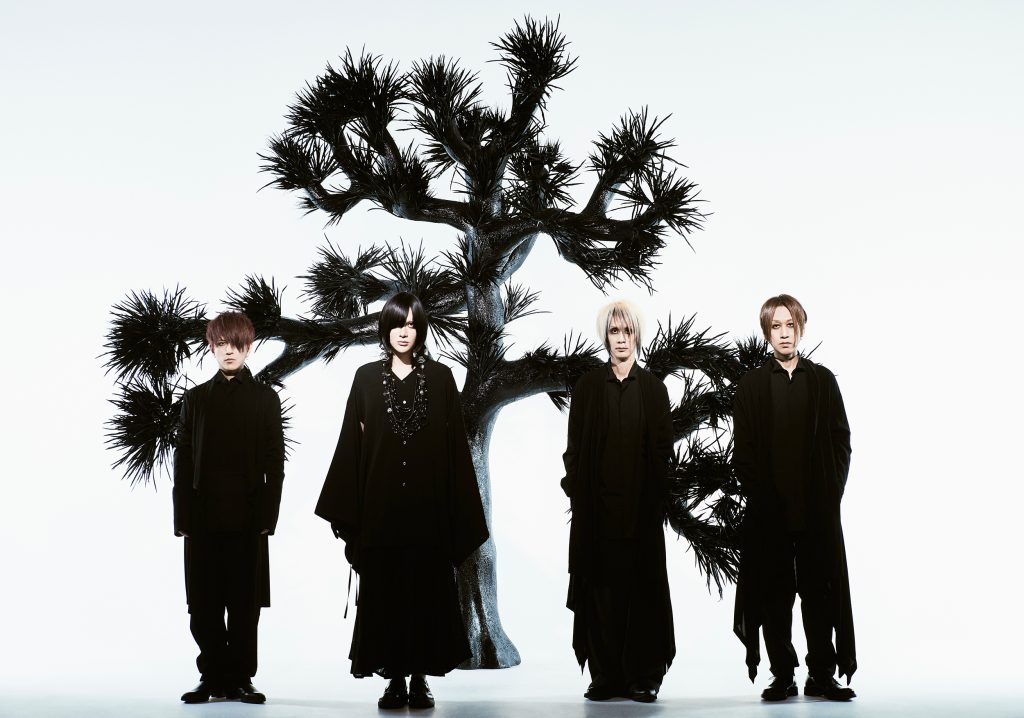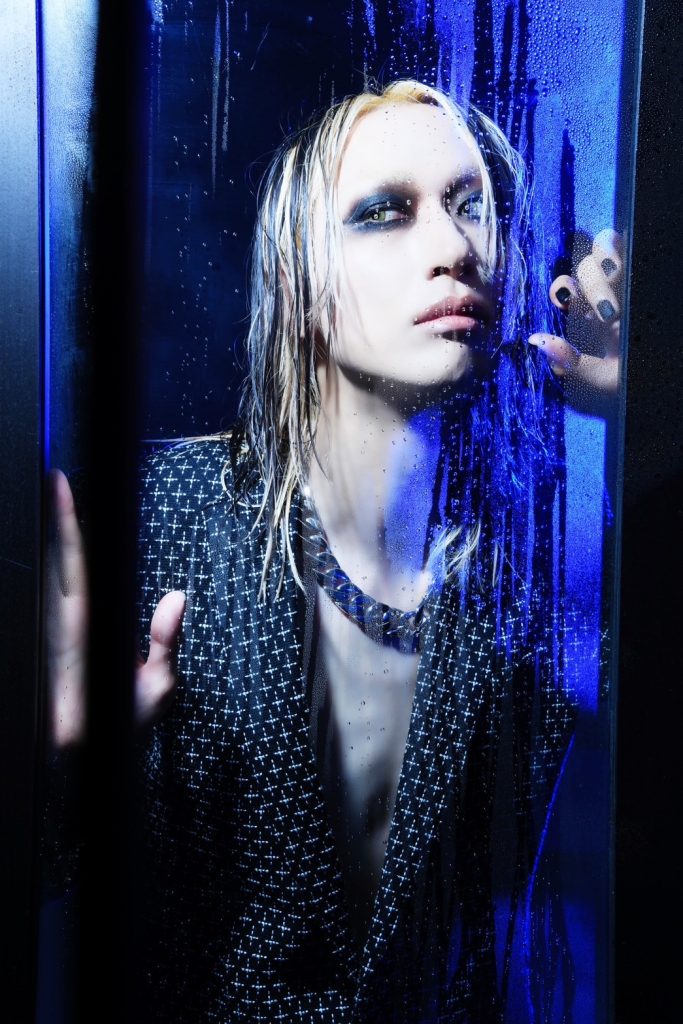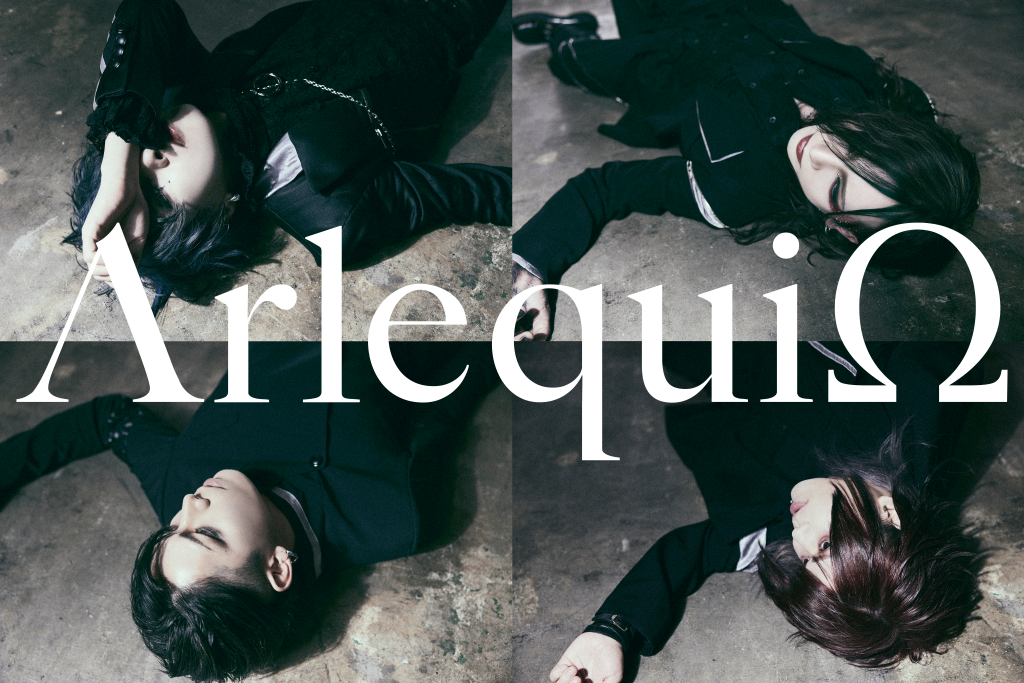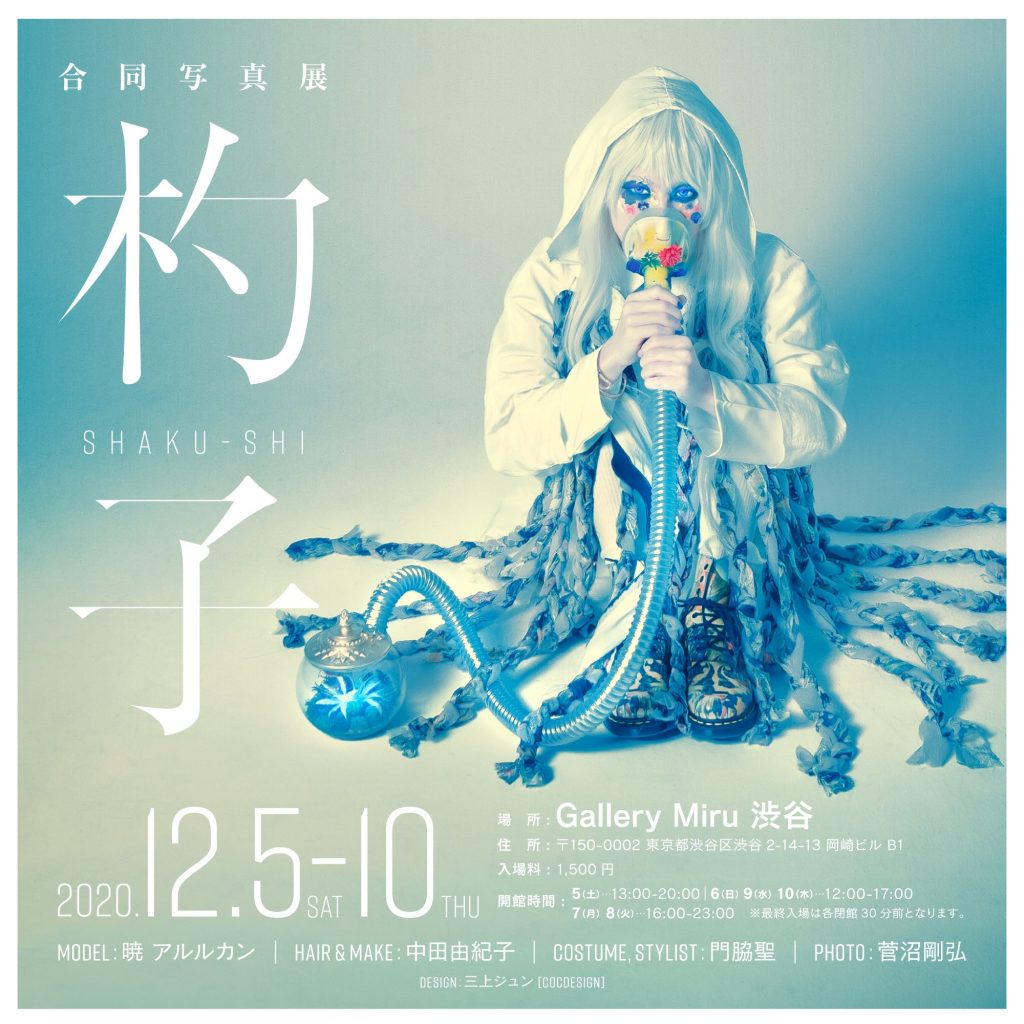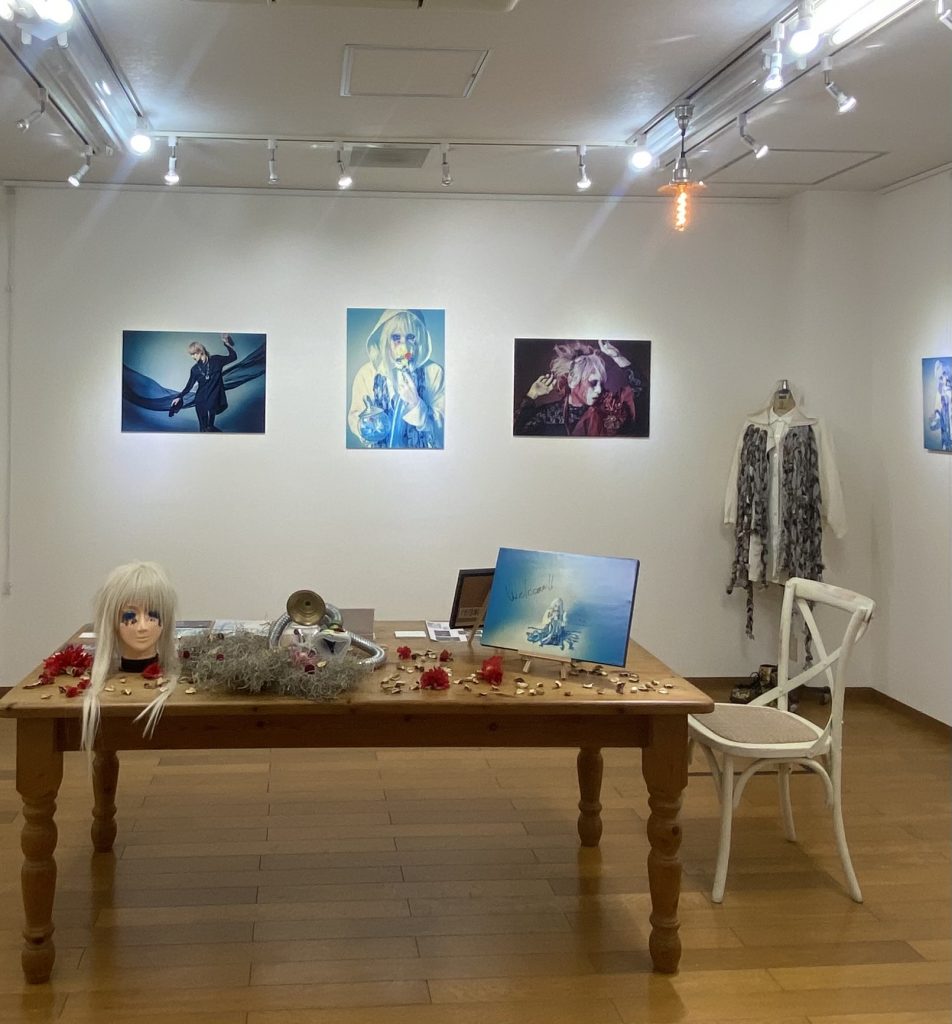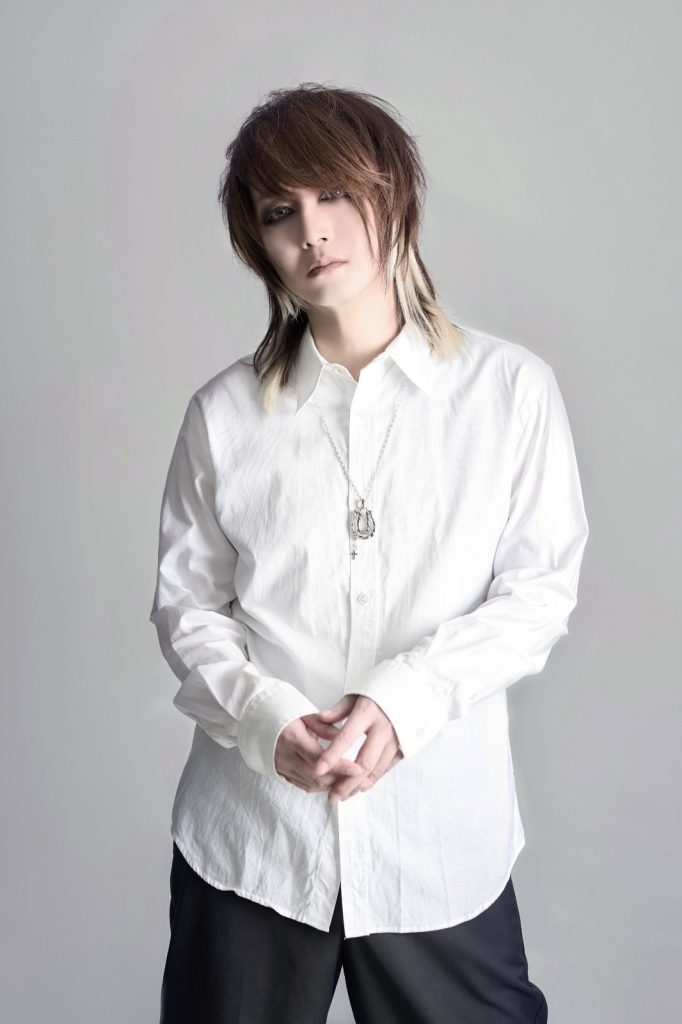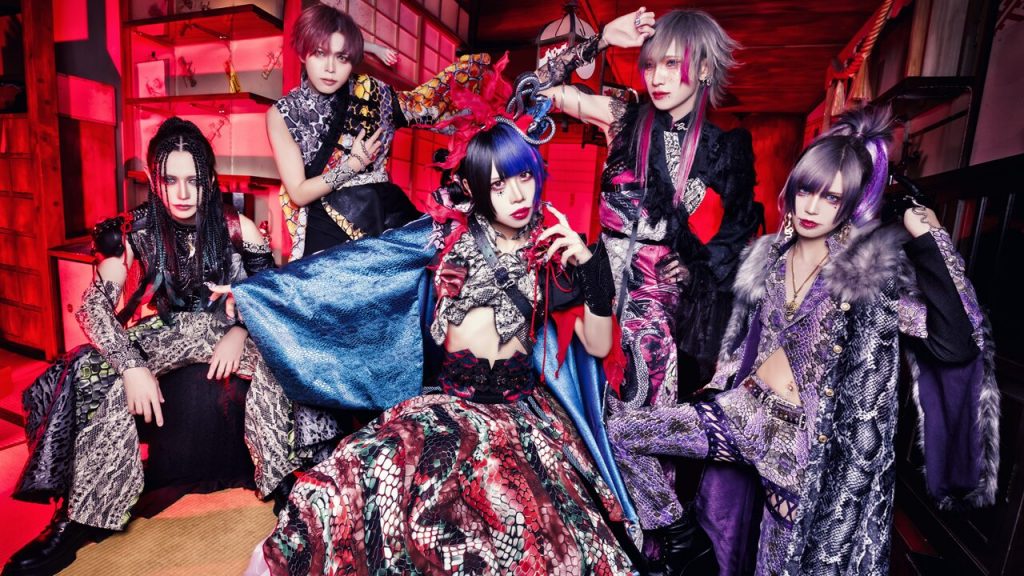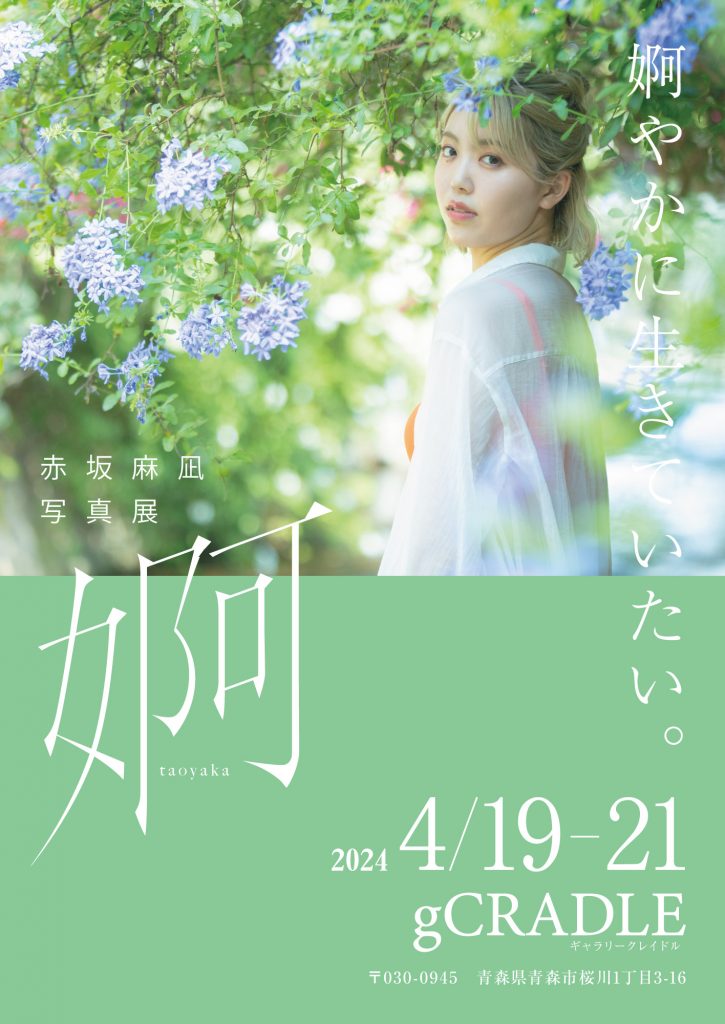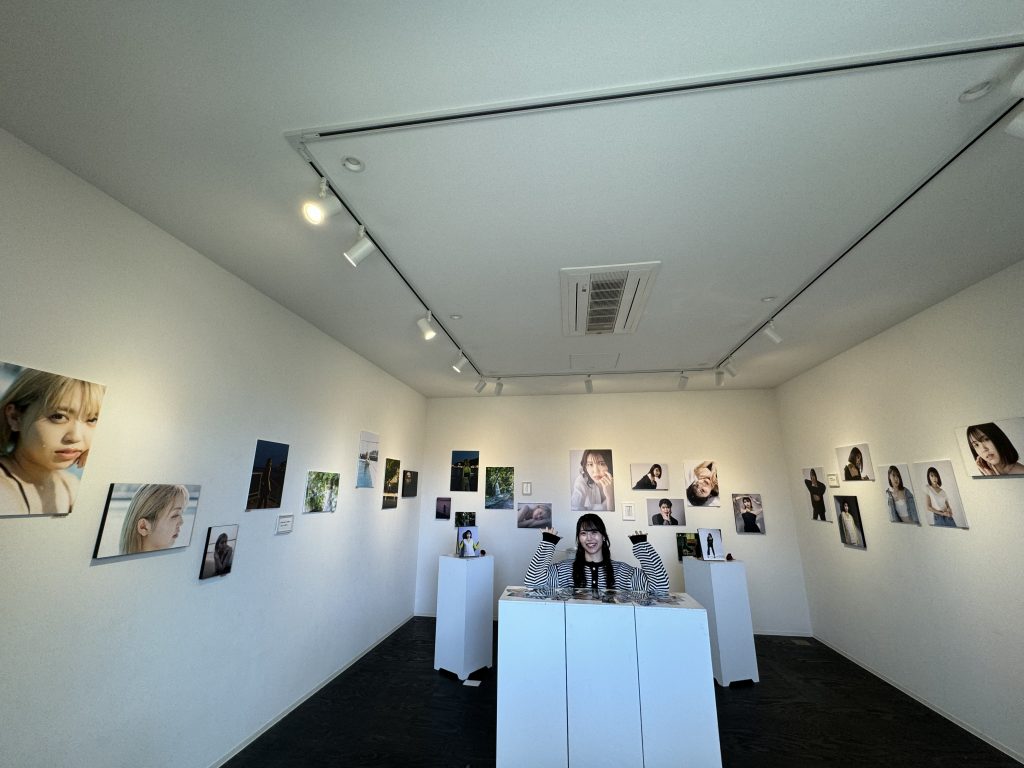In the music industry (especially in the world of visual kei!), where every performance, music video, and photoshoot is a statement, a skilled hair and makeup artist is indispensable.
Today, we’re sitting down with Yukiko Nakada, a talented hair and makeup artist who, through her love for beauty and art, has honed her craft in an industry that demands both incredible creativity and technical precision.
Creating unique looks for commercials, music videos, and concerts, she has built a career in a field where even one mistake can cost future opportunities. How does she handle the pressure? What’s it like shaping the ever-evolving visual identity of musicians? And how are new, iconic looks born? Let’s find out!
ー To start off, and to get to know you a bit better, would you mind introducing yourself without mentioning your current profession?
I am not used to introduce myself without talking about my work (laughs)…My name is Yukiko Nakada, but people at work usually call me Yukky. I am born and raised in Tokyo and my family had a Japanese traditional sweets shop. Looking back, I think I had more opportunities than most to be exposed to beautiful things from a young age, such as the colors and aesthetics of traditional Japanese sweets.
As my hobby became my job, my life revolves around hair and makeup, so even on my days off I do things related to my makeup and cosmetics. During my student years I went to a beauty vocational school as well as art university. I especially love modern art, so I like going to the Mori Museum and art exhibitions or watching theater plays. Recently, I’ve been especially enjoying Mika Ninagawa's solo exhibition, Yuuko Higuchi's works, and going to watch apparel events.
Another big hobby of mine is traveling. Just yesterday, I got back from a work trip in Thailand, and I really love working abroad.
ー What was your favorite travel destination so far?
All of the places were great, so it's hard to choose just one, but I really loved California. The cityscape was beautiful!
ー As people grow into adulthood, many young people start becoming more conscious of their appearance and begin using makeup. However, not many decide to turn that interest into a career. What initially sparked your interest in hair and makeup? And how did that interest develop into a career?
I think a huge influence was getting into the band GLAY when I was in elementary school. I was especially drawn to JIRO’s hair and makeup, so I even went to “Fats Berry”, the salon that did his styling, to get my hair cut just like him (laughs). When I reached high school and started thinking about my future path, I couldn't imagine pursuing anything other than hair and makeup, so it felt natural to choose that path.

ー As you mentioned that you were a fan of bands yourselves, you have experienced this industry from both the perspective of a fan and that of a staff member. Has your perspective about the work changed before and after entering this industry?
Well, I’ve liked GLAY since I was in elementary school, and back then, I simply thought, "This hairstyle looks nice, this makeup looks nice!". However, when I started approaching it as a job, it wasn’t just about thinking, "This hairstyle looks cool, so let’s try it." Instead, I focus on the overall balance and make sure it fits the song that the look is for. If there are five members, I consider how to balance things for all of them. Of course, there are restrictions, so it’s a process of translating the concept into the hair and makeup. I’m not sure if I’m fully answering the question about whether my mindset has changed, but I’ve definitely become more determined to approach my work with a sense of responsibility.
ー I can imagine that hair and makeup for live shows, commercials, and music video shoots often start early in the morning and go late into the night. Beyond the actual hair and makeup application, how much additional preparation and work is required? Could you walk us through a typical day in your routine?
On concert days…I spend about 1 to 1,5 hours doing each person’s makeup. For example, on a typical day I arrive at the venue at 10 AM, set up my workspace, and do hair and makeup for three band members. In between, there’s a rehearsal, after which I do makeup for another member. In total, I prepare four people, do final touch-ups for everyone, and by then, it’s already showtime.
During the performance, I stay backstage or near the monitor in case someone needs me. Before the encore, I help pat away sweat and fix their hair. After the show, if there are interviews or meet-and-greets with invited guests, I do another round of touch-ups. Concert days are always hectic from start to finish.
As for commercials or music video shoots, they often start very early in the morning, so I have to take the first train or even arrive with the last train the night before.
Hearing me talk about it, you might think it's a very harsh workplace, but I love this industry and my work, and since my hobby became my job, I don't really find it tough. Though, when the shoots pile up, it is indeed tough on the body (laughs).
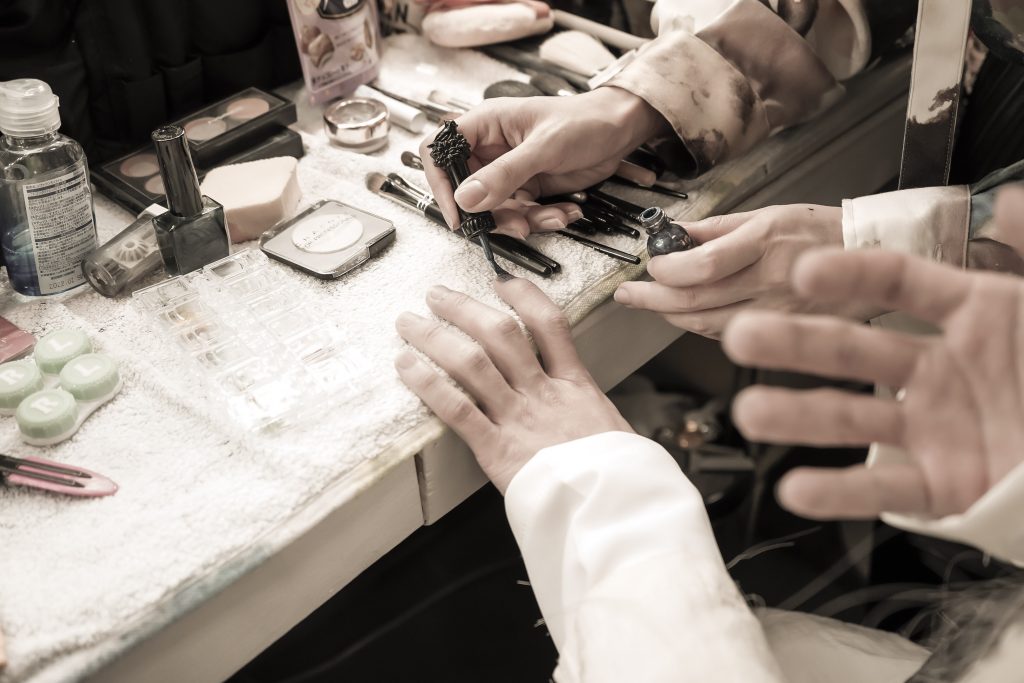
ー This industry really has way more behind-the-scenes preparation than you would think!
That might be true (laughs). What I shared earlier was the flow of a typical day, but before a new request for artist photos even reaches me, I think the artists themselves have done a lot more preparation. It’s a really challenging world.
ー When you’re in charge of the hair and makeup for popular artists, I imagine there are high expectations not only from the artists themselves but also from their fans. How do you handle such expectations and pressure? Also, are you curious about the reactions and feedback from the artists themselves or the fans regarding the hair and makeup you’ve done for them?
Honestly, I’m not someone who feels much pressure. I used to get nervous, but after doing this job for a while, I’ve realized that feeling pressured is just a disadvantage...Things will turn out as they will and you can’t do anything beyond your abilities, so you just do what you can. I just try to do my best and be true to myself in the moment. That’s my ideal approach (laughs). And of course, I’m always happy to receive reactions and feedback on my work!
ー In the visual kei scene, the artist's concepts and worldviews are particularly important, and hair and makeup play a crucial role in bringing them to life. If possible, could you share the process from the initial request from the artist to the actual artist photo shoot? Are there many discussions and collaborations with stylists and artists?
For artist photoshoots, the process begins with the theme of the song and the costumes being decided, and I base my work on these elements. For the artists I work with, there’s usually a lot of collaboration with the costume designer from an early stage, so I discuss the hair and makeup with them even during the rough planning phase. Depending on the hairstyle, I may request certain hair accessories from the designer, so we have many meetings to plan everything. For artists I style for concerts, we often have meetings before the concert day where I might ask them to visit a hair salon to have their hair dyed a certain way.
For photoshoots with artists I haven’t worked with before, we have meetings via LINE or ZOOM. I gather various references and propose ideas, mainly drawing inspiration from overseas models, fashion show makeup, and stills from films. I also make a point to visit museums, new spots, and exhibitions in my daily life, which helps me incorporate fresh ideas into my work.
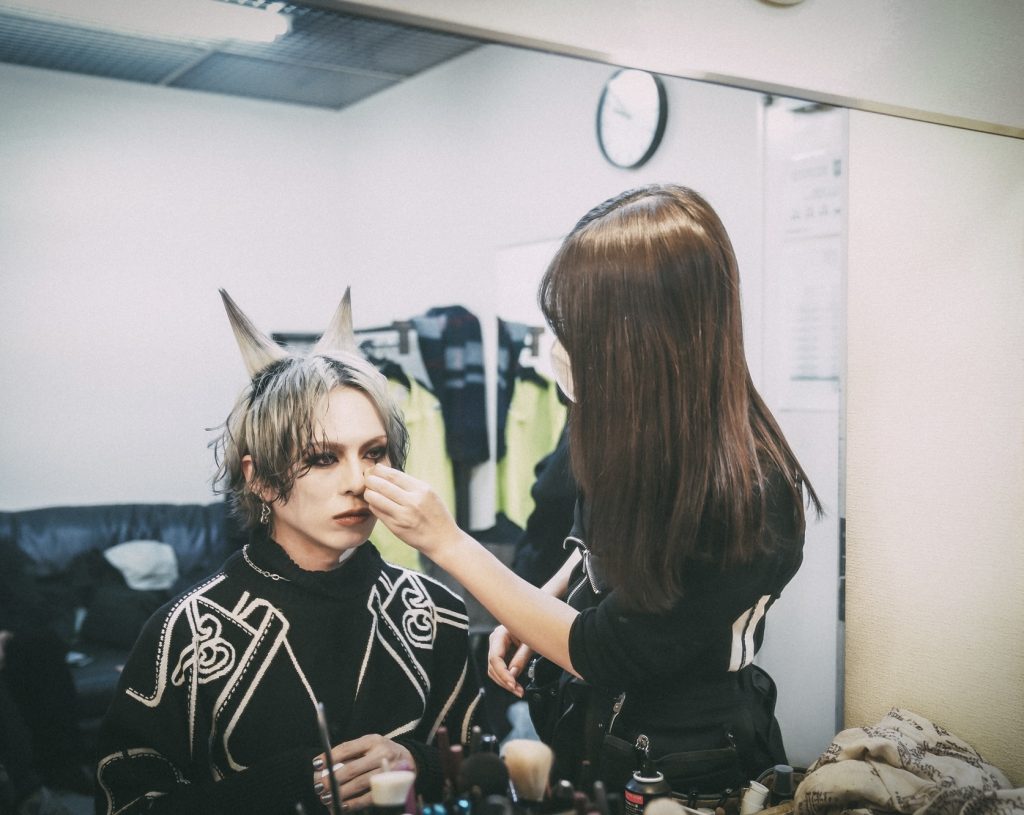
ー You also work as a lecturer at a vocational school and give makeup lessons. Could you tell us more about that experience and how it came about?
It first started with the makeup lessons during the pandemic. At that time, there was zero work and I thought I couldn’t just sit around and wait, so I wanted to do something. I also held a photo exhibition with Aki from ΛrlequiΩ during the pandemic, which made me think about doing something different, which resulted in the makeup lessons. Many fans came to the lessons and it makeup lessons and it made me really happy.
When I was offered the chance to be a lecturer at a vocational school, I really thought about it for a long time before accepting. Honestly, I thought teaching is so far from my personality (laughs). But I really enjoy teaching and I myself learned a lot from my seniors.
Right now, I’m thinking about recruiting new assistants, so if anyone is interested after reading this, feel free to send me a DM (laughs).
As of this spring, I will end my work as lecturer after 4 years for now, but it was very a very valuable experience for me.
ー What is the most important thing for you when it comes to hair and makeup?
It’s conversation and observation. By getting to know the person more deeply, I want to understand them to the point where I can describe what they like or the nuances they want to express better than they themselves can. Even if someone has something they want to do, there are few people who can put it into words. So, I try to understand their intentions and then bring it to life for them.
ー There are trends in makeup and hairstyles, but do you think that general trends also influence visual kei hair and makeup? Or do you feel like it’s a completely different world?
I think that’s a difficult question. Even within visual kei, there are detailed sub-genres, so whether to incorporate trends or not depends on the band or the person, and I carefully consider if it suits them. Also, I don't just include what's trending as it is; I always make sure to transform it and incorporate it in my own way. I don't want it to just be like, “Ah, that's trendy. Everyone's doing it these days”. Answering that in an interview makes me realize that I’m quite competitive (laughs).
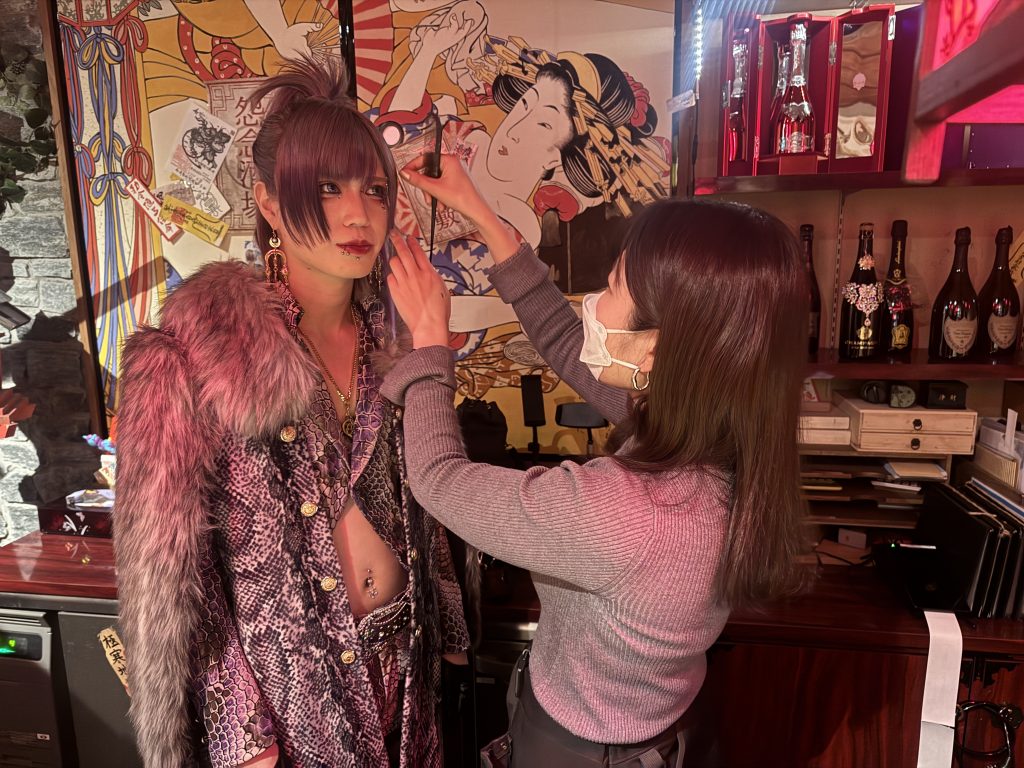
ー Have you always had this competitive trait?
I think it started with my job. Back in school, I didn’t really care about things like losing at sports events or how my grades were... But since I love my work, “losing” in makeup feels frustrating. It’s not exactly a competition, but I do feel disappointed when things don’t turn out as expected. And when it comes to work, if you make a mistake, there might not be another chance. I had some frustrating experiences early on, and I think that’s when my competitive side started to emerge.
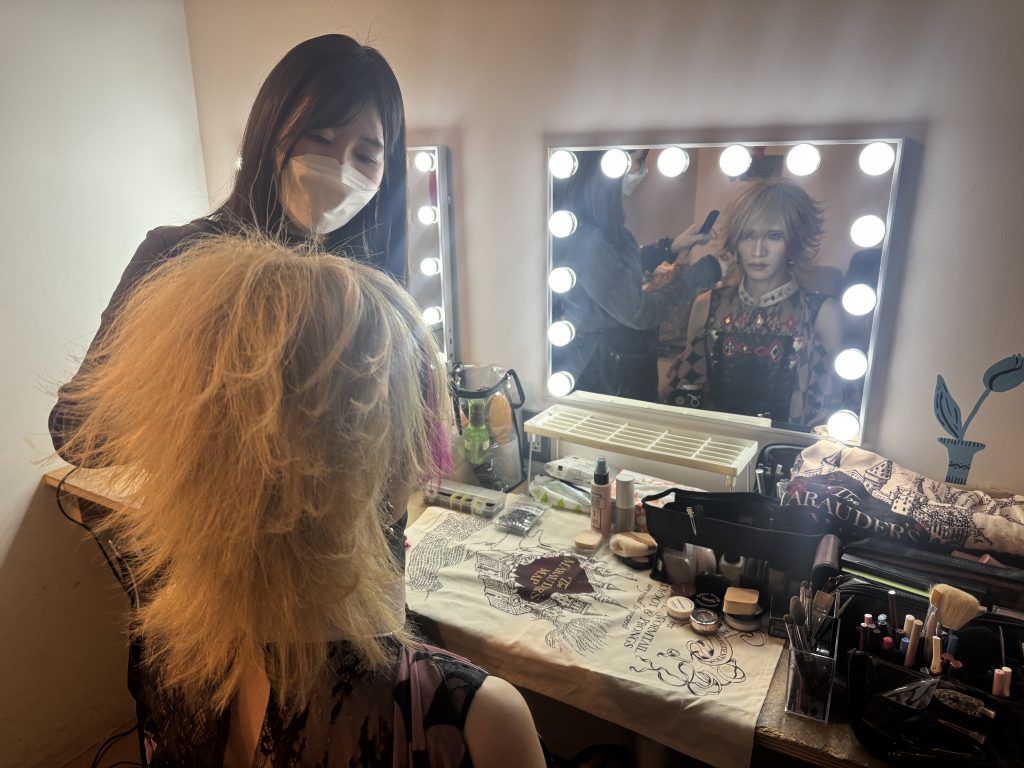
ー What were those moments, where you felt that disappointment?
It was really at the very beginning, when I went to my first job. Looking back, I can’t believe I actually went, as I had no knowledge at all and thought, “Let’s just give it a try”. As you can imagine, I couldn’t do anything. I applied foundation the same way I would on myself, but since my client was a man, I was like, “Huh?” (laughs).
ー Aah, their skin is different, isn't it?
Completely different... And choosing the right color is so difficult! Doing my own makeup takes about an hour, but when I tried doing makeup on someone else for the first time, it took forever…I should've expected that (laughs).
ー That must have been a shock!
It was. That’s why immediately enrolled into school after that (laughs).
ー You went on tour in Japan and overseas, worked on commercials and music videos, so you must have experienced a lot during your career. What was the most memorable experience for you?
The first world tour I had the opportunity to join was a big turning point for me. Each country had different voltage, humidity, temperature, and backstage environments...everything was different. Despite being in an unfamiliar environment, I wanted to deliver the same quality as I would in Japan. It was a tour that taught me a lot.
ー That sounds tough! What were the most difficult situations you were facing?
As for the difficult situations…When we arrived at that one venue, there were only bar stools (laughs). Usually the artists are sitting and we are doing their makeup while hovering around them like in a beauty salon, but that venue had only bar stools, so I had to look up at them while doing their makeup (laughs). I quickly had staff search for a regular chair, and somehow, I got one. There was also a time when the difference in voltage caused a hairdryer I brought from Japan to catch fire.
ー Oh no, what do you do if you cannot use a tool you need?

When the dryer caught fire, I was really panicked and had to rush to buy a new one. It was supposed to be suitable for overseas use, but since we had passed through several countries, the voltage might not have matched the one in that country. Having to use a new hair dryer I haven’t used before after that was difficult.
ー I can imagine that for work overseas, you'll need both personal items and a lot of things for work, which must make packing quite a challenge. How do you decide what to bring with you?
Going on that world tour, I brought two suitcases. Even for jobs in Japan, my hair and makeup tools alone weigh around 23 kg. For overseas trips, I pack extra backup items, like a second hair iron and dryer, in case one breaks. Because of that, my makeup suitcase is completely packed. In addition, I bring another suitcase, about 90 liters, for my personal belongings.
— That must be tough! During a tour, with constant travel and long working hours, I imagine it’s easy to get sick. But since there’s no other hair and makeup artist, you probably can’t take a break if you’re unwell, right? Is there anything you do to maintain your health?
Luckily, I’ve never gotten seriously ill during a tour, but I always carry several types of medicine just in case. I also pay attention to what I eat. It’s a common precaution, but when I’m feeling tired, I avoid things like ice and raw foods.
ー Is there anything you wish you would have known before starting your career?
I think I should have taken some more detours. I tend to act quickly once I make up my mind, so when I decided to become a hair and makeup artist, I jumped straight into the industry. Thinking back, if I had worked in a salon or gained technical skills at a wig-making company before entering the industry, I might have brought a different perspective and more value to my work. It's just a 'what if' speculation though (laughs).

ー Many dream of becoming a hair and makeup artist, but what is your personal approach to achieving your dreams or goals?
I think it’s important to be taught. Whether it’s school, doing assistant work or working under an agency. Also connections with people are important, as well as doing things instead of just thinking about them.
ー Is there a dream you're currently working towards?
I want to create something on my own. I mentioned this a bit in the previous question, but the photo exhibition "shaku-shi" that I held during the pandemic, or the photo exhibition I organized with Mana Akasaka, are examples of that. Rather than just focusing on hair and makeup, I want to create and bring new ideas to life.
I’ll keep creating exciting things, so I’d love for people to keep an eye on my work!
ー My last main question is, what is your "why"? Why do you do what you do?
In the end, it’s all about the people and relationships. The reason I am here is that I got told by people “I will introduce you!”, “You would work really well with this person, you should do make up for them!” and got connected as a result.
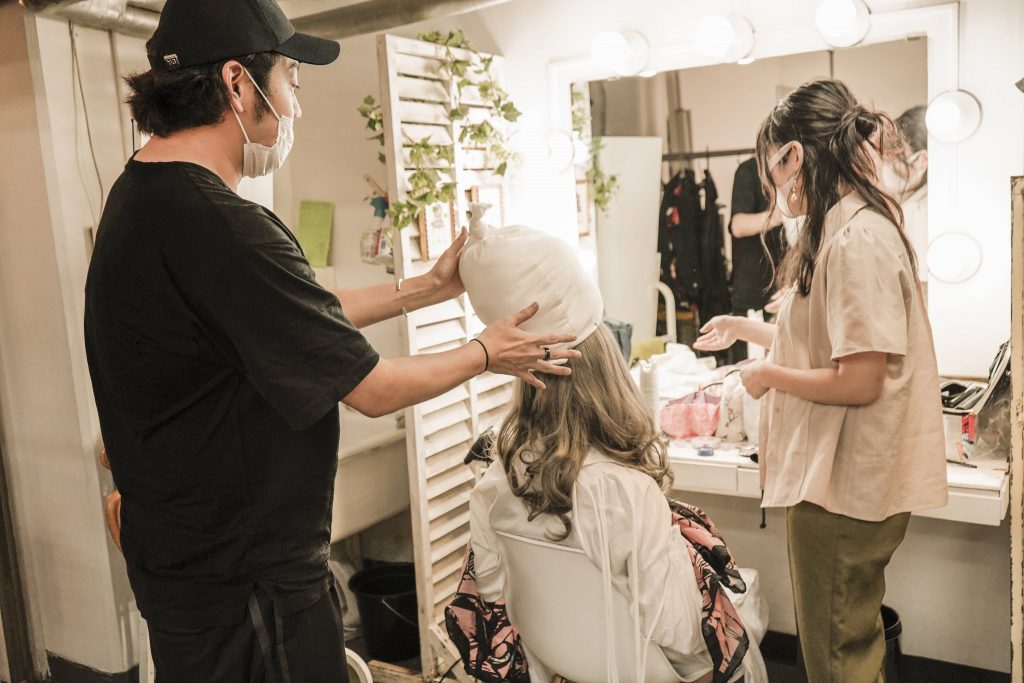
ー That’s a great answer, thank you so much! If you don’t mind, I would like to do a small speed round Q&A with you! Just try to answer intuitively, no need to think long about the questions. First question is: Have you noticed any habits you've developed because of your job?
Yes. I pay close attention to people’s makeup! (laughs)
ー What is your favorite makeup brand?
Estee Lauder.
ー What is a favorite product you can’t live without?
Estee Lauder Double Wear
!
ー If you had to do an artist's hair and makeup with only 3 items, what would you use?
That’s difficult!! (laughs) Only 3!
ー Yes, all items dissapeared and only three were left!
Foundation. Gel liner. And……some lip product.
ー Working late nights or early mornings?
Late nights.
ー Do you have personal rules at work?
Yes. Always keeping the tools clean.
ー What is your favorite atmosphere at work?
A happy one! (laughs)
ー What is the first item you’d recommend to a beginner in makeup?
First of all make up brushes.
ー Any words or phrase you use at work most?
Probably “That’s nice!”. Words that lift the mood.
ー Regardless of your job, what music do you like?
I still like GLAY. I also like rock, but listen to a wide range of music, such as K-POP as well.
ー Anything you’re obsessed with lately?
I am really into cosmetics from Thailand.
ー And last but not least, what colour describes you the most?
I would say pink describes me the most. I end up buying pink things. I wouldn’t think it would be a favorite colour of mine, but subconsiously the things around me and in my home got quite pink with time (laughs).
ー That’s it! Thank you so much! :)
Thank you!
Text & Interview: Olga Mazlina
Check out Yukiko Nakada's instagram account here 👉INSTAGRAM
